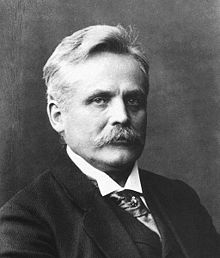Wilhelm Wien | |
|---|---|
 Wien in 1911 | |
| Born | Wilhelm Carl Werner Otto Fritz Franz Wien 13 January 1864 |
| Died | 30 August 1928 (aged 64) |
| Alma mater | University of Göttingen University of Berlin (PhD) |
| Known for | |
| Relatives | Max Wien (cousin) |
| Awards | Nobel Prize in Physics (1911) Guthrie Lecture (1925) |
| Scientific career | |
| Fields | Physics |
| Institutions | |
| Doctoral advisor | Hermann von Helmholtz |
| Doctoral students | Gabriel Holtsmark Eduard Rüchardt |
Wilhelm Carl Werner Otto Fritz Franz Wien (German: [ˈvɪlhɛlm ˈviːn] ; 13 January 1864 – 30 August 1928) was a German physicist who, in 1893, used theories about heat and electromagnetism to deduce Wien's displacement law, which calculates the emission of a blackbody at any temperature from the emission at any one reference temperature.
He also formulated an expression for the black-body radiation, which is correct in the photon-gas limit. His arguments were based on the notion of adiabatic invariance, and were instrumental for the formulation of quantum mechanics. Wien received the 1911 Nobel Prize for his work on heat radiation.
He was a cousin of Max Wien, inventor of the Wien bridge.